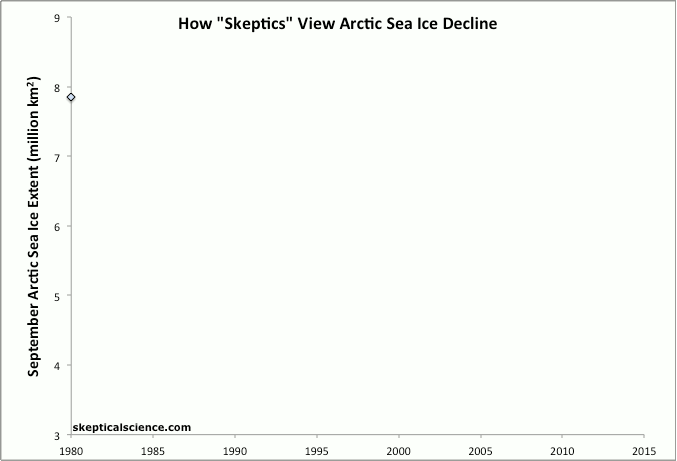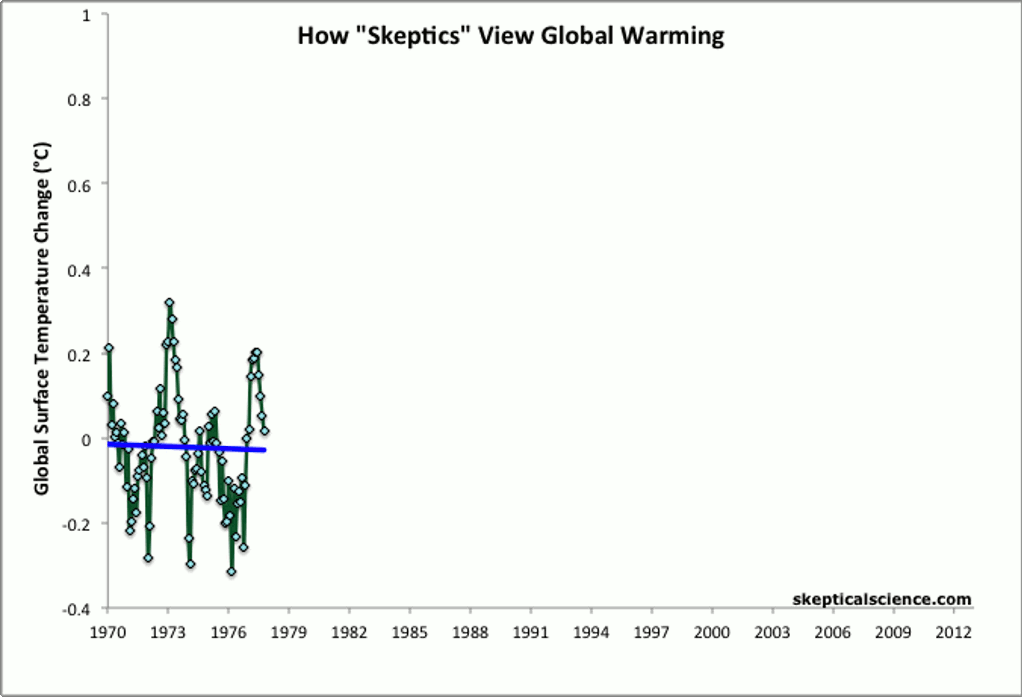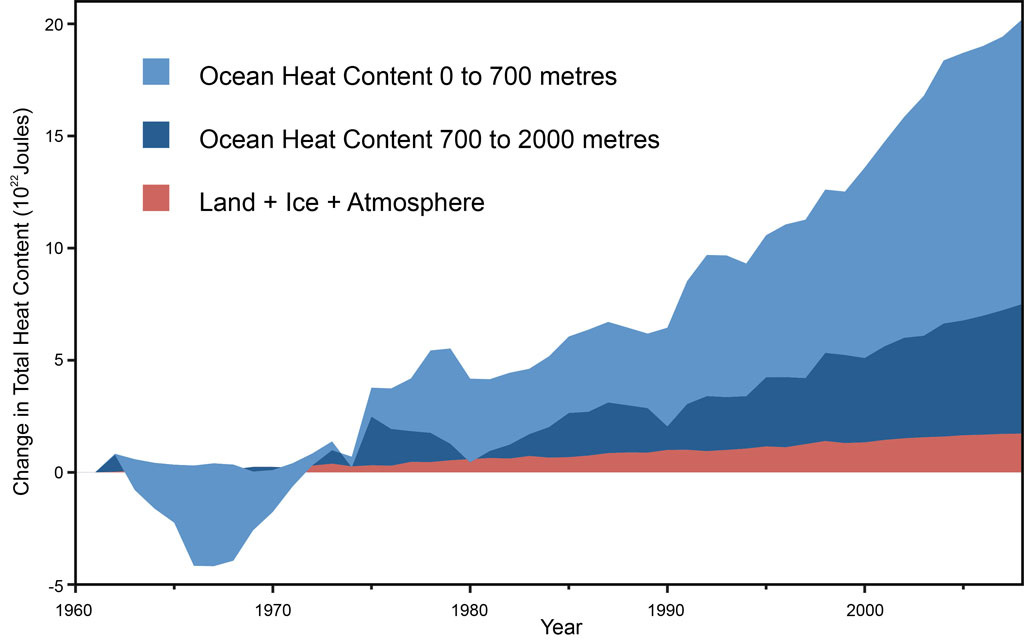Arctic sea ice delusions strike the Mail on Sunday and Telegraph
Posted on 13 September 2013 by dana1981
When it comes to climate science reporting, the Mail on Sunday and Telegraph are only reliable in the sense that you can rely on them to usually get the science wrong. This weekend's Arctic sea ice articles from David Rose of the Mail and Hayley Dixon at the Telegraph unfortunately fit that pattern.
Both articles claimed that Arctic sea ice extent grew 60 percent in August 2013 as compared to August 2012. While this factoid may be technically true (though the 60 percent figure appears to be an exaggeration), it's also largely irrelevant. For one thing, the annual Arctic sea ice minimum occurs in September – we're not there yet. And while this year's minimum extent will certainly be higher than last year's, that's not the least bit surprising. As University of Reading climate scientist Ed Hawkins noted last year,
"Around 80% of the ~100 scientists at the Bjerknes [Arctic climate science] conference thought that there would be MORE Arctic sea-ice in 2013, compared to 2012."
Regression toward the Mean
The reason so many climate scientists predicted more ice this year than last is quite simple. There's a principle in statistics known as "regression toward the mean," which is the phenomenon that if an extreme value of a variable is observed, the next measurement will generally be less extreme. In other words, we should not often expect to observe records in consecutive years. 2012 shattered the previous record low sea ice extent; hence 'regression towards the mean' told us that 2013 would likely have a higher minimum extent.
The amount of Arctic sea ice left at the end of the annual melt season is mainly determined by two factors – natural variability (weather patterns and ocean cycles), and human-caused global warming. The Arctic has lost 75 percent of its summer sea ice volume over the past three decades primarily due to human-caused global warming, but in any given year the weather can act to either preserve more or melt more sea ice. Last year the weather helped melt more ice, while this year the weather helped preserve more ice.
Last year I created an animated graphic called the 'Arctic Escalator' that predicted the behavior we're now seeing from the Mail on Sunday and Telegraph. Every year when the weather acts to preserve more ice than the previous year, we can rely on climate contrarians to claim that Arctic sea ice is "rebounding" or "recovering" and there's nothing to worry about. Given the likelihood that 2013 would not break the 2012 record, I anticipated that climate contrarians would claim this year as yet another "recovery" year, exactly as the Mail on Sunday and Telegraph have done.
Arctic sea ice extent data, 1980–2012. Data from NSIDC.
In short, this year's higher sea ice extent is merely due to the fact that last year's minimum extent was record-shattering, and the weather was not as optimal for sea ice loss this summer. However, the long-term trend is one of rapid Arctic sea ice decline, and research has shown this is mostly due to human-caused global warming.
When Will the Arctic be Ice-Free?
Both Rose and Dixon referenced a 2007 BBC article quoting Professor Wieslaw Maslowski saying that the Arctic could be ice free in the summer of 2013. In a 2011 BBC article, he predicted ice-free Arctic seas by 2016 "plus or minus three years." Other climate scientists believe this prediction is too pessimistic, and expect the first ice-free Arctic summers by 2040.
It's certainly difficult to predict exactly when an ice-free Arctic summer will occur. While climate research has shown that the Arctic sea ice decline is mostly human-caused, there may also be a natural component involved. The remaining sea ice may abruptly vanish, or it may hold on for a few decades longer. What we do know is that given its rapid decline, an ice-free Arctic appears to be not a question of if, but when.
Continuing Global Warming
Both articles also claimed that "some scientists" are predicting that we're headed into a period of global cooling. Both named just one scientist making this claim – Professor Tsonis of the University of Wisconsin, whose research shows that slowed global surface warming is only temporary. In fact, Tsonis' co-author Kyle Swanson wrote,
"What do our results have to do with Global Warming, i.e., the century-scale response to greenhouse gas emissions? VERY LITTLE, contrary to claims that others have made on our behalf."
Both articles also wrongly claimed that global warming has "paused" since 1997. In reality, global surface temperatures have warmed over the past 15 years, albeit more slowly than during the previous 15 years. It is possible to cherry pick a shorter time frame over which global surface temperatures haven't warmed, as I illustrated in my other animated 'Escalator' graphic.
Average of NASA GISS, NOAA NCDC, and HadCRUT4 monthly global surface temperature anomalies from January 1970 through November 2012 (green) with linear trends applied to the timeframes Jan '70 - Oct '77, Apr '77 - Dec '86, Sep '87 - Nov '96, Jun '97 - Dec '02, and Nov '02 - Nov '12.
However, the opposite is true of the overall warming of the planet – Earth has accumulated more heat over the past 15 years than during the prior 15 years.
Global heat accumulation data (ocean heating in blue; land, atmosphere, and ice heating in red) from Nuccitelli et al. (2012).
Recent research strongly suggests that the main difference between these two periods comes down to ocean heat absorption. Over the past decade, heat has been transferred more efficiently to the deep oceans, offsetting much of the human-caused warming at the surface. During the previous few decades, the opposite was true, with heat being transferred less efficiently into the oceans, causing more rapid warming at the surface. This is due to ocean cycles, but cycles are cyclical – meaning it's only a matter of time before another warm cycle occurs, causing accelerating surface warming (as Tsonis' research shows).
It would be foolhardy for anyone to predict future global cooling, and those few who are so foolish are unwilling to put their money where their mouth is, as my colleague John Abraham found out when challenging one to a bet, only to find the other party unwilling to stand behind it.
Rose and Dixon Invent an IPCC 'Crisis Meeting'
Both articles also claimed the Intergovernmental Panel on Climate Change (IPCC), whose Fifth Assessment Report is due out in a few weeks, has been forced "to hold a crisis meeting." This claim made both articles even though Ed Hawkins noted,
"I told David Rose on the phone and by email on Thursday about the IPCC process and lack of 'crisis' meeting."
Unfortunately that didn't stop Rose from inventing this meeting, or Dixon from repeating Rose's fictional reporting in the Telegraph.
Yes, Humans are Driving Global Warming
Finally, both articles quoted climate scientist Judith Curry claiming that the anticipated IPCC statement of 95 percent confidence that humans are the main cause of the current global warming is unjustified. However, Curry has no expertise in global warming attribution, and has a reputation for exaggerating climate uncertainties. In reality, the confident IPCC statement is based on recent global warming attribution research. More on this once the IPCC report is actually published – any current commentaries on the draft report are premature.































 Arguments
Arguments

































We have set our hearts on hauling the Mail in front of the Press Complaints Commission.
Should anyone here wish to help out or read all about it probably the best place to start is at "The Great White Con"
Well if US courts respect and uphold climate science, presumably a Press Complaints Commission might follow legal precedent.
In reality I fear the PCC has far less teeth than a great white shark, and that US legal precedents don't carry a whole lot of weight over here in the UK. Nevertheless we shall pursue matters to the bitter end!
David and Judy are on show again in the Mail this Sunday morning. More over on the Arctic Sea Ice Blog.
Jim Hunt @ 1
I wish you the very best of luck. It is difficult to see how we stop such people unless they face some form of meaningful sanction, though I have my doubts that any complaint to the PCC will result in such.
It would be better for the U.K. media at least to face another Leverson type enquiry, but this time on the deliberate publication of misinformation on climate change, surely a more important issue than the hacking of some celebrity's 'phone in order to discover who they were sleeping with - information that will be long forgotten by this time next year, or even next week, let alone by the time climate change is wreaking its seemingly inevitable havoc, I fear.
P.S. - Great graphic on your 'Great White Con' link! Have you offered it to the Mail and Telegraph? I am sure they would jump at the chance to show graphically what they are obviously trying (and failing) to say in words, being such honest and upstanding fellows that they are, of course.
Here is the link to the latest David Ruse nonsense in the Rail on Sunday mentioned @3. An interesting quote from Myles Allen apparently made "last night" that will likely get some discussion. The headline pronouncement of the nonsense is effectively debunked by this AR4 graphic showing the 1956-2005 trend that Ruse says has been revised so much in the final draft AR5 that he say he's got hold of. He (or his paper) also takes ambiguous credit for their early detection of "the global warming ‘pause’ first reported by The Mail on Sunday last year."
Or try here for the AR4 graphic.
@funglestrumpet - Thanks for your kind words. As recommended by the PCC I have had several communications with the Managing Editor of the MoS. A brief extract:
Them - "If you wish to express a different opinion, you are welcome to write a letter for publication which I will forward to our letters editor for consideration. "
Us - "There's been a large "hole" in the sea ice near the North Pole for weeks. It's invisible in the images in your article. 100-200 words is nowhere near enough to explain the significance of that one "inaccuracy" to your readership, let alone all the others."
More on my own blog:
http://econnexus.org/the-great-white-con-continues/
I've had a question for a while about the heat content chart. What is the "dip" in the ocean heat content between 1960 and 1970? Is that a plot artifact, or have to do with the baseline? It's just always a bit weird how it starts at 0, then drops, then jumps back up. I reference people to that chart fairly often but some of them point to that drop and try to cliam there's something wrong.
Part of the explanation is Agung. See figure 2 of Domingues et al. 2008 and especially Balmaseda et al. 2013.
The author correctly points out that, compared to the 2012 record lows of Arctic ice area and volume, a relative recovery in both was to be expected in 2013 and this has occurred – but with what effect on ice cover in future years?
Increased area of sea ice cover in 2013, means that albedo has also recovered so might we expect a further increase in area covered by sea ice in 2014?
Or will on-going Arctic amplification of average global surface warming combined with loss of 2013 ice volume outweigh the effects of increased albedo, resulting in decline of sea ice mass and area in 2014?